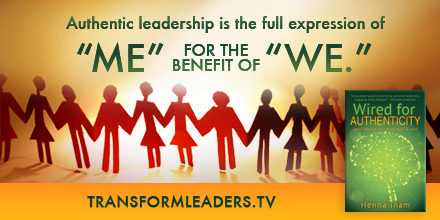 Welcome to Week 32 of the Authenticity@Work Leadership Tool-kit! My intention for this series is to share a quick tool each week to help you lead with more authenticity, adaptability and inspiration so we can together create workplaces where we bring the best of ourselves and inspire others. So grab a journal and an accountability partner to make these practices even more powerful for you!
Welcome to Week 32 of the Authenticity@Work Leadership Tool-kit! My intention for this series is to share a quick tool each week to help you lead with more authenticity, adaptability and inspiration so we can together create workplaces where we bring the best of ourselves and inspire others. So grab a journal and an accountability partner to make these practices even more powerful for you!
In last week’s post we discussed accepting all the cast of characters who make up the whole, integrated, you. Did you notice parts of yourself that you normally wouldn’t consider? How can you bring those parts into your leadership?
An expanding body of neuroscience research indicates that we don’t make decisions rationally as much as we would like to believe. Neuroscientists are now discovering that our decisions are a finely tuned blend of both emotion and logic, and how much of each depends on the situation.
Emotions we avoid prevent the full expression of who we are and limit our possibilities. Blocked emotions actually prevent us from getting self-aware and can be blind spots that can derail our leadership.
Human beings are hardwired to make decisions using emotions. Often emotions operate below our conscious awareness in our decision making and can never be fully suppressed. For example, it is what makes giving and receiving tough feedback really hard.
Most of us expect workplaces to be devoid of feelings—at least those feelings we consider “negative.” In general, we much prefer that workplaces be rational places where we make rational decisions supported by PowerPoint slides full of conclusions supported by data.
As we avoid both acknowledging and discussing emotions at work (because they are unacceptable in the first place), we miss out on important cues into others and what is happening with them in the present
As we become aware and accepting of our own emotions, we become more finely tuned and accepting of the emotions in others. In fact, it’s critical to our having emotional intelligence, which has shown to be more important than IQ in predicting success.
This Week’s Tool:
What emotions or parts of yourself are currently unexpressed? Which of these will you commit to integrating so you can expand your ability to lead effectively across a range of leadership challenges?
What emotions do you allow yourself to experience? What emotions do those who know you well would say you avoid? How do you compensate for emotions you avoid (e.g., if you are afraid of anger, you may be overly sweet or passive aggressive, may numb yourself with food, exercise, alcohol, work, etc.)? How does avoiding this emotion hold you back? What would experiencing these emotions open up for you?
Get the latest resources for Authenticity@Work (this tab will get updated with all kinds of cool resources). Curious to know more about the book? Read the reviews about Wired for Authenticity here.

